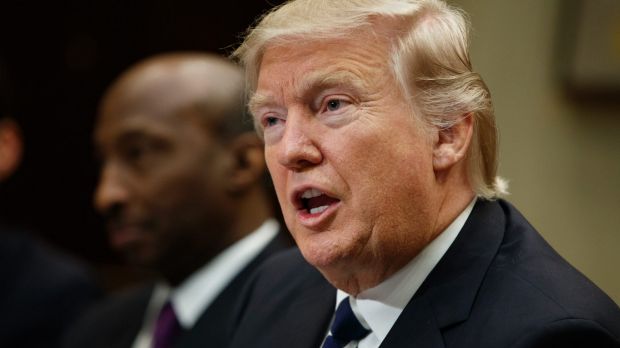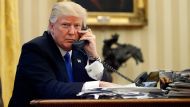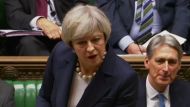I was somewhat surprised this week to see Humpty Dumpty emerge from the early chaos of the Trump administration, repeating, "in a rather scornful tone", on behalf of Donald, "When I use a word ... it means just what I choose it to mean – neither more nor less".
Alice (as it happened from the ABC) chipped in, "The question is ... whether you can make words mean so many different things." To which Humpty (and Donald) replied "The question is ... which is to be the master – that's all".
More World News Videos
Worst call by far: Trump
The US President has taken to Twitter, this time revealing his thoughts on Australia's refugee deal as PM Malcolm Turnbull assures us, the agreement is still in play. Courtesy 2GB.
Trump tells Turnbull that he will honour the Obama "commitment" to consider the resettlement in the US of some of the detainees on Manus Island. His press spokesman confirms it, but another White House staffer then says Trump is still considering it.
The fact is that although Obama made a commitment "to consider", it was always at the discretion of the US as to how many, if any, they would ultimately accept, as each detainee was to be vetted again by the US. Obama made no commitment to a number or timetable.

So, Trump can acknowledge the commitment, and then use extreme vetting to decide against taking any. Indeed, as most of the Manus detainees are from one of Trump's seven banned countries, from which all refugees will be subjected to the same extreme vetting, he risks being seen to be undermining his own executive order, if he accepts ours, while excluding others.
We have also been told that this ban is not discriminatory against Muslims or particular countries, even though the seven countries all have Muslim majorities. To a Trump supporter, this is – nudge, nudge, wink, wink – anti-Muslim.
The now declared justification for the order is "anti-terrorist", but none of the seven countries have been a source of terrorist-initiated deaths in the US over the last few decades, while terrorists from several other excluded Muslim countries have been the source of thousands of deaths.
Clearly, words such as "commitment", "extreme vetting", "discriminatory" and "terrorist" will ultimately mean what Donald chooses them to mean – He is the Master, and "The Word"!

And, when Donald says "America First", take it that he also means "America Only". Alliances will only mean anything to him if they fit His perceptions of "America's interests".
Also, recognise, that Humpty Donald will ultimately have a "Big Fall", but not just from his "Wall"!
Neither Turnbull nor Shorten reflected these two realities in their addresses to the Press Club this week, yet they should be accepted as fundamental to any strategising and policy development.
They both seem to "hope" that our alliance with the US will guarantee us some sort of favoured treatment, but in doing so miss the significance of the "Uber moment" for the world economy/community that is Trump.
While both Turnbull and Shorten essentially conceded the electorate's disengagement with politics and our politicians, and its unwillingness to trust our politicians to fix our "broken political system", both used words to mean what they chose them to mean, even though the electorate sees through the words to their inaction.
To be fair, both did declare a commitment to restore integrity to our politics, with proposals to deal with politicians' expenses, and campaign donations – transparency and accountability – but the electorate has heard all this before, several times, as they have awaited the next expenses/donations scandal.
The electorate mostly doesn't listen any more to what our politicians say, but looks to outcomes, to judge them by what they do.
While both leaders did provide some policy detail – Turnbull on childcare and energy, and Shorten on skills and training – their addresses were full of the oft-repeated platitudes, generalities and slogans, about jobs, job security, productivity and growth, new industries, confidence, health, education, innovation, infrastructure, housing affordability, border security, various plans, and so on, while each effectively claiming to "understand" the day-to-day financial struggle of the average Australian, and committing to it ease it for them.
All just more words to the average voter, with the meanings they each like to attach to them. For example, both were committed to "Jobs, Jobs, Jobs", but provided almost no detail about which jobs, in which industries, in which regions, let alone about the transitions required of many having to move from declining to developing industries, as full-time jobs are collapsing and underemployment is mounting.
Turnbull did stick with his big tax cuts, but shifted the emphasis to claim that this would bring jobs and wage increases, irrespective of how it is financed, and Shorten did place much emphasis on skills and training, but again essentially in a jobs vacuum.
Unfortunately, while some battle lines were drawn for 2017, to the voter it reeks of unreality, of just more of the same, with, at best, a commitment to "muddle through".
John Hewson is a professor at the Crawford School of Public Policy, ANU, and a former Liberal opposition leader.














0 comments
New User? Sign up